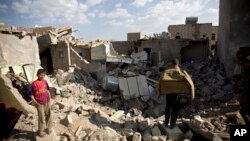The United Nations said Tuesday that the last of its international staffers had left Yemen, while the U.N. human rights chief warned that the country was on the verge of a "total collapse."
U.N. spokesman Farhan Haq said the 13 remaining international staffers had been withdrawn and would return when "circumstances permit." He said the U.N. envoy to Yemen, Jamal Benomar, had been relocated to Jordan.
Haq said all of the U.N. work in Yemen would now be done by several hundred local staff members.
In Geneva, the U.N. High Commissioner for Human Rights, Zeid Ra'ad Al Hussein, said the "situation in Yemen is extremely alarming," with dozens of civilians killed in recent days. He condemned all attacks on hospitals and other medical facilities, noting they are protected under international law.
The United Nations said Tuesday that 93 civilians had been killed and 364 wounded in the past five days during airstrikes by a Saudi-led coalition against Yemen's Houthi Shi'ite rebels.
Airstrikes continued for a sixth day Tuesday, destroying missiles and weapons depots around the capital, Sana'a. The strikes are meant to halt the momentum of the Iranian-backed rebels, who have advanced toward Yemen's main southern city, Aden.
Iran said Tuesday that it had sent aid to Yemen but denied shipping weapons to the country. The state-run IRNA news agency quoted a foreign ministry spokeswoman as saying allegations of arms shipments to the Houthis were "complete fabrications."
The United Nations and international aid agencies expressed alarm Tuesday at the rapidly deteriorating human rights and humanitarian situation in Yemen. The International Committee of the Red Cross appealed to the warring factions to allow delivery of supplies needed to treat casualties from clashes and airstrikes.
The International Organization for Migration said 40 people were killed and 200 wounded in an airstrike Monday near a refugee camp in northern Yemen. Humanitarian workers said the bombing had targeted a nearby military installation in the district of Haradh. Yemen's foreign minister blamed a Houthi artillery strike for the refugee camp casualties.
UNHCR spokesman William Spindler told VOA his agency had registered about 250,000 refugees in Yemen, mostly Somalis. But Ethiopians, Iraqis and other nationalities have registered as well. He said previous fighting had displaced about 340,000 people in Yemen.
A former professor at the University of Aleppo in Syria, Azad Hemoto, told VOA's Kurdish service that the tensions between Saudi Arabia and Yemen were nothing new.
“Yemen and Saudi Arabia have a history of strained relations," Hemoto said. "For example, in 1936, Saudi Arabia annexed the Asir region from Yemen. Also, there is an economic incentive for Saudi Arabia to attack Yemen. There are many Yemeni workers from Hadhramout who work in Yemen, and they have been burdensome for the Saudis. So there are other reasons, beyond the Shiite-Sunni factor, that drive Saudi Arabia’s policies in Yemen.”
Hemoto also said the current conflict is really a proxy war between Iran and Saudi Arabia.
“But it is not only about Yemen; it is about the entire Gulf region," he said. "The internal environment in Yemen presented an opportunity for both sides [Iran and Saudi Arabia] to carry out this proxy war.”
After seizing Sana'a last year, the Houthis have advanced toward Aden, the economic center of the impoverished nation. The insurgents shelled Aden with artillery Monday as they pushed into the northeastern outskirts of the city, while Saudi fighter jets continued to pound rebel positions. Officials said the Houthis and supporters of former President Ali Abdullah Saleh battled local militias.
The country's current president, Abd-Rabbu Mansour Hadi, had declared Aden the provisional capital before he fled the country for Riyadh last week. Hadi's aides said he has no immediate plans to return there.
VOA's Lisa Schlein contributed to this report from Geneva. Some material for this report came from Reuters and AP.





